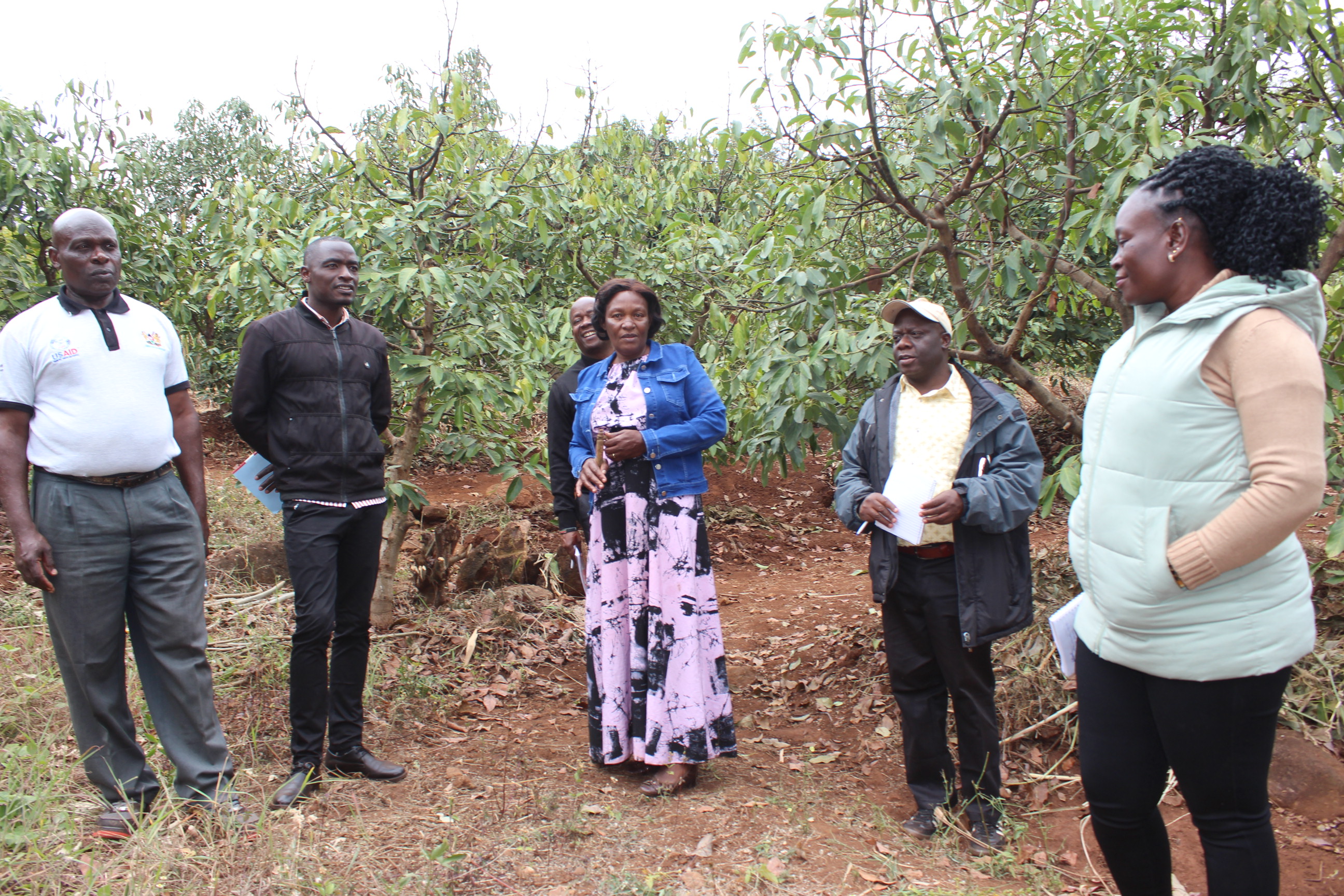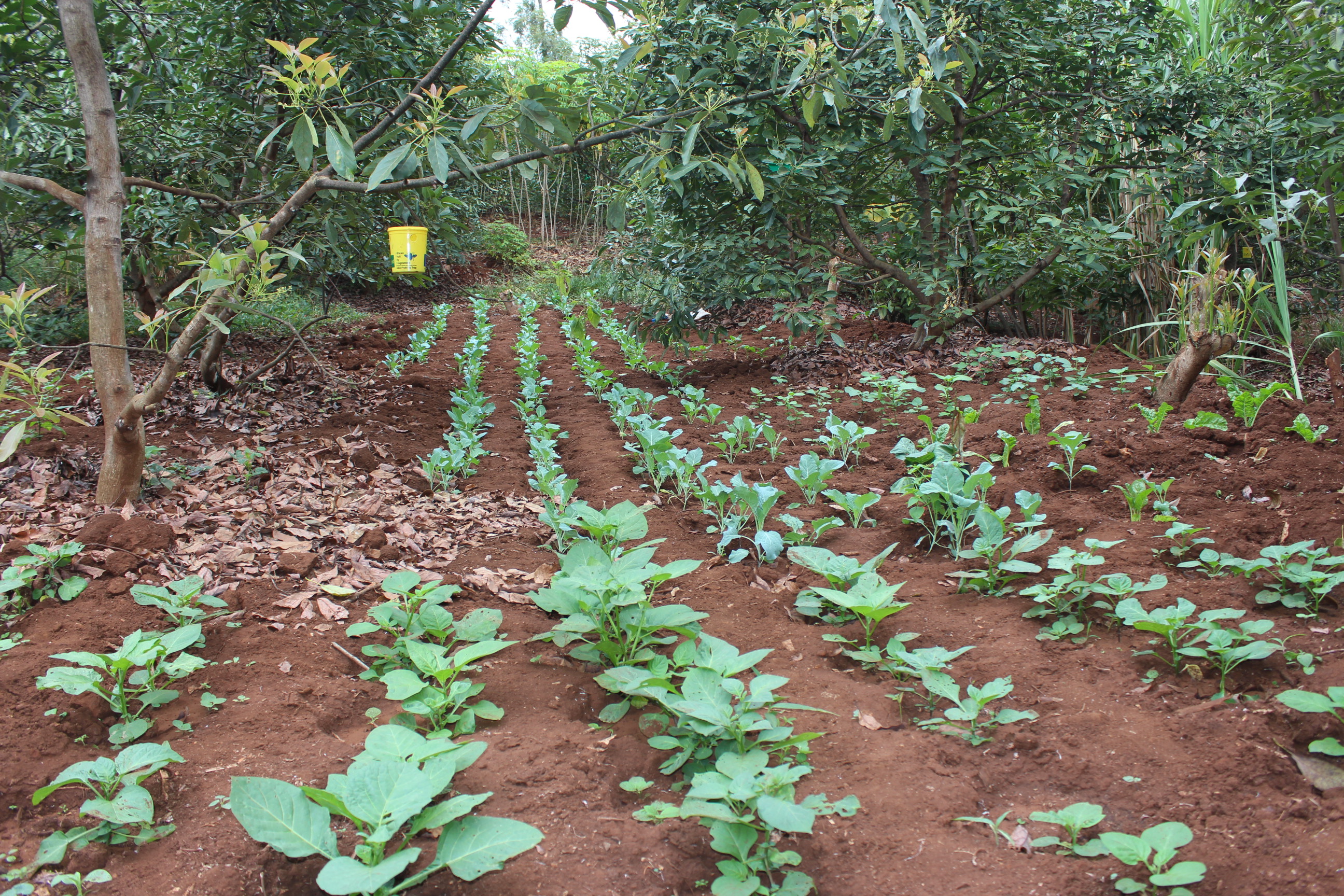
 Officials from Trans Nzoia county during a visit to Moses Ngugi's farm in Kamahuha, Murang'a /Alice Waithera
Officials from Trans Nzoia county during a visit to Moses Ngugi's farm in Kamahuha, Murang'a /Alice WaitheraMany people consider Trans Nzoia County the food basket of the country, with the highest maize production.
For decades, the county has been producing at least seven million 90kg bags of maize annually due to the fertile soils and favourable weather.
But with over-use of synthetic chemicals, the soil fertility has reduced, which has affected the county’s harvest. Its position as the country's food basket has been overtaken by others, such as Uasin Gishu.
Agriculture chief officer Patrick Osoro said the county government has put in place measures to help farmers boost production.
“We have been issuing free maize seedlings and encouraging our farmers to use lime to reduce the high soil acidity. Previously, farmers would unknowingly buy uncertified seeds, which affected their harvests,” he said.
With most being smallholder farmers and having less than an acre, Osoro said the interventions have seen them produce up to six bags of maize on a 0.2 acre farm, making them food secure, with an annual production of 5.6 million 90kg bags worth about Sh23 billion last year.
He said, however, the county is seeking sustainable ways of supporting farmers to produce more, prompting the shift towards agroecology.
The county is currently in the process of drafting an agroecology policy that will provide for more allocations and detail ways of promoting agroecology better.
Osoro, who spoke while on a benchmarking tour in Murang’a county, said his team had been impressed by local farmers’ ability to invest in water harvesting and soil conservation while producing their own fertilisers.
Christine Nasimiyu, a farmer from Trans Nzoia, said she has been among those promoting agroecology in the county to ensure families have safe and sufficient food.
“I am a coffee and indigenous food farmer. As a woman
leader in agroecology, we have been encouraging all women to ensure they plant
vegetables on their farms and grow them organically to keep their households
healthy,” she said.
Nasimiyu, the leader of Women Farmers Association
of Kenya in Trans Nzoia, said incorporating women in conservation goes a long
way in preserving the environment while ensuring farms are utilised sustainably.
“I’ve been inspired by Murang’a farmers to use banana stalks
and macadamia husks to produce manure. It’s also impressive how they have been
able to intercrop to maximise the available space and use herbs as medicine”.
Such farmers, she said, should get premium returns for their
produce to encourage them to produce more.
Mary Irungu, the policy and advocacy programme officer under
Participatory Ecological Land Use Management (Pelum) Kenya, an association for
various civil society organisation dealing with agroecology, said the
benchmarking trip was organised to help Trans Nzoia start the policy
drafting process.
 The county is seeking sustainable ways of
supporting farmers to produce more, prompting the shift towards agroecology.
The county is seeking sustainable ways of
supporting farmers to produce more, prompting the shift towards agroecology.Pelum Kenya is one of the organisations that have been instrumental in supporting Murang’a county to implement agroecological strategies.
“We’ve been promoting agroecology and working with national and county governments that developed agro-policies such as Murang’a. We’re happy to see an increased momentum of other counties jumping on board to start formulating laws,” she said.
Irungu said Murang’a is far ahead in the implementation of agroecology and the Trans Nzoia teams had learnt what practices local farmers have adopted and the impact of agroecology on communities.
They have also learnt the challenges faced during the
implementation process and how they can be manoeuvred, and best agroecological
practices so they can come up with an implementable policy, she added.
Irungu said acidic soils have heavily affected the county’s food
production and they are looking for ways of rejuvenating them for better returns.
In Kenya, Irungu said there’s a high prevalence of
non-communicable diseases, mainly contributed by consumption of poor quality
food and foods with high levels of chemicals that impact human bodies
negatively.
“Promoting agroecology is the only way to ensure we provide
safe food that won’t weaken people’s health. It’s a key preventive measure for
many diseases,” she said.
“The national government has established the National
Agropolicy for Food Systems Transformation intending to transit the agriculture
sector towards sustainability.”
Irungu said more Kenyans have started
consuming organic foods with heightened awareness of their benefits.
Pelum Kenya has been organising indigenous seeds and food
fairs to spread the awareness and get more smallholder farmers on board. Last year’s event was held in Kisumu while this year’s will be in
Laikipia.
Moses Kariuki, an agribusiness officer under Murang’a county
government, said the administration has been up-scaling promotion of
agroecology after realising many diseases were being caused by harmful agrochemicals.
Since then, farmers have planted vegetables,
legumes and indigenous foods organically, and cash crops such as coffee and
avocados are slowly being incorporated to attract better prices in the exports
market.
“Since we launched our agroecology policy in 2023, we have
been seen an influx of counties visiting to benchmark on our implementation
strategies and more are welcome,” he said.
Moses Ngugi, a farmer from Kamahuha whose farm is a
demonstration site for agroecology said any one can pick a fruit from his
orchard and eat directly as the trees have never been sprayed with
chemicals.
“I have practiced agroecology for five years. It’s a process. It’s not instant. I saw results after about three years of rehabilitating my soils but once they were fully rejuvenated, the harvests have been worth it.
Instant Analysis
For decades, the Trans Nzoia would produce at least seven million 90kg bags of maize annually due to the fertile soils and favourable weather. But with the over-use of synthetic chemicals, the soil fertility reduced, effectively lowering the county’s harvest and it was overtaken by others such as Uasin Gishu. The county is now seeking sustainable ways of supporting farmers to produce more, prompting the shift towards agroecology.

















